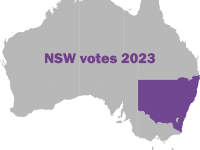Community Colleges Australia (CCA) has released its NSW Election Policy Platform for the upcoming 25 March election. The platform has been sent to all major candidates for the lower house, with a request for their support for adult and community education (ACE) providers during the next term of government.
The Policy Platform requests the next New South Wales Government to recognise, support, empower and enable the state’s not-for-profit for-purpose ACE providers.
New South Wales ACE Sector
ACE providers represent an important force in NSW training, with almost 40 ACE providers delivering post-secondary education and training. In 2021, NSW ACE providers delivered accredited vocational education and training (VET) to 13% (168,835 learners) of the state total 1,293,455 students. This was more than half the number delivered by TAFE (23%, 300,950 students). NSW community providers delivered government-funded VET to 35,275 students, 7.6% of the state total (TAFE delivered to 60%, 278,365 students).
Increased employment: NSW ACE providers achieved the greatest increase of adult learners employed after training, with a 15.6% increase, compared to 11.6% for TAFE, 6.6% for private for-profit providers and a state average of 11.3%.
Meeting the needs of disadvantaged learners: NSW ACE providers disproportionately cater for students from the state’s most disadvantaged groups and regions:
- 10.6% students had a disability;
- 45.9% regional and rural students;
- 59.7% most disadvantaged students;
- 19.4% non-English speaking background students;
- 34.8% older (age 45+) students; and
- 11.4% First Nations students.
Social capital: Because of its community base, NSW ACE providers are significant builders of social capital, particularly in regional, rural and outer metropolitan areas where educational institutions are part of the “glue” that holds communities together.
NSW ACE sector strengths include community-based and community-governed with the best interests of their communities at heart, not profit; inclusive learning environments; integrated formal, non-formal and informal learning opportunities; ability to collaborate with other ACE providers to produce better student and community outcomes; and delivering skills that enable health, well-being and increased civic participation. NSW ACE providers have served their communities since 1913, the year Workers Education Associations (WEAs) were established.
“CCA is proud to represent such an historic sector of Australian education, with providers that have adapted to educational, economic and social changes over many years, continuing to serve their communities with distinction,” says CCA CEO, Dr Don Perlgut.
What does CCA want for NSW ACE?
Legislative recognition through a NSW government structure established by Parliament, like the previous Board of Adult and Community Education, along with national recognition of community education through a national ACE Ministerial Statement.
Establish state ACE targets at a minimum of 15% of total VET students and 10% of government-funded VET students.
Operational support to undertake outreach and engagement of vulnerable and disadvantaged learners who have withdrawn from training due to natural disasters and COVID-19; and facilities funding to support digital transformation and ensure buildings are accessible to people with disabilities.
Program funding increase of 50% for the NSW Adult and Community Education (ACE) Program to at least $37 million/year, as an effective investment in the state’s future; annual ACE Program funding indexation; and extension of ACE Program contract timelines from one year to a minimum of three years to provide certainty, flexibility and greater innovation in delivery.
Increase foundation skills funding, because of the intensive nature required for the lowest educational level of learners and the total “volume of learning” needed.
Recognise digital literacy and digital inclusion are inter-connected; teaching of digital literacy skills cannot be undertaken without ensuring disadvantaged learners have proper access to IT hardware, software and high speed bandwidth.
Older worker retraining funding to NSW ACE providers to assist the workers in new employment skills.
Governance and leadership support to ensure proper governance and best practice is implemented.
Workforce development support in high need areas and ACE expertise such as aged and disability care and early childhood learning, as well as investment to restore the state’s depleted foundation skills workforce.
Quality of teaching investment through a model like the Victorian VET Development Centre (VDC) to promote the development and raise the professional standing.
Pathways and collaboration between the ACE sector and TAFE NSW, mandated collaboration with TAFE NSW so that the needs of the state’s learners can be met, including access to excess facilities and land at not-for-profit rates and recognition of ACE providers as partners into regional migration integration.
Regional skills and economic development through a state-wide training plan that incorporates a spatial/geographic analysis to skills provision; does not operate from 50,000 up, builds on the deep and diverse strengths of the NSW ACE sector; recognises the importance of in-person skills training for vulnerable and disadvantaged learners; and supports innovative ACE economic development projects such as business incubators, collaborations with Aboriginal training providers, social enterprises, employment programs and model mental health projects.
(Download a complete copy of the CCA Election Policy Platform in PDF.)





